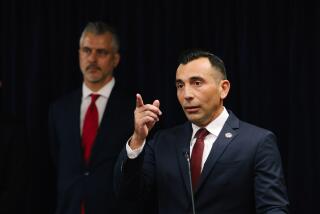FBI Terrorism Hunt Is Going International
WASHINGTON — Rushing to counter the rise of global terrorism and crime, the FBI plans to open field offices in Afghanistan, Indonesia, Bosnia and as many as 10 other hot spots and to send additional agents elsewhere overseas, officials said Friday.
The effort will formalize a dramatic shift in the FBI’s operations since the Sept. 11 attacks on the World Trade Center and the Pentagon. Hundreds of agents have been temporarily deployed around the globe in pursuit of terrorists and those supporting them.
It is also a significant expansion of an effort begun in the mid-1990s by former FBI Director Louis J. Freeh to make the FBI an international crime-fighting operation that works closely with law enforcement and intelligence counterparts around the world.
“Terrorism is certainly one of the driving factors, but it is also in response to the global nature of crime,” said Roderick L. Beverly, special agent in charge of the FBI’s Office of International Operations. “We live in a global society, and the barriers and impediments we once had -- methods of communications, transportation -- are no longer barriers for legitimate businesses, nor are they barriers for organized crime.”
FBI Director Robert S. Mueller III told Congress recently that the existing overseas FBI offices proved invaluable immediately after the Sept. 11 attacks, when agents fanned out across dozens of countries, tracking leads, interviewing suspects and cooperating with local authorities.
He said agents deployed overseas -- permanently and temporarily -- made significant contributions to other investigations, including the bombing of a Bali nightclub in October and the fatal shooting of a U.S. diplomat in Jordan this year.
Since the 2001 attacks, as many as 500 agents and 200 support people have been working overseas on the Sept. 11 terrorism investigation and related inquiries, in addition to FBI agents already established in 45 foreign embassies. Those agents, known as permanent legal attaches, or “legats,” work closely with authorities in host countries, as well as with the CIA and other U.S. agencies that have an overseas presence. They pursue criminal investigations as well as intelligence-gathering, Beverly and other officials said.
The expansion, first reported Friday by Associated Press, will add five legal attache offices immediately -- in Abu Dhabi, United Arab Emirates; Kuala Lumpur, Malaysia; Tunis, Tunisia; Sana, Yemen; and Tbilisi, Georgia. That expansion will cost about $23 million and already has been approved by Congress and the State Department, which houses the agents and support staff within U.S. embassies, FBI officials said.
The expansion plan also calls for adding 17 agents and 13 support staffers to the nearly 200 FBI personnel already stationed at attache offices. Those locations include Amman, Jordan; Islamabad, Pakistan; Ottawa; Riyadh, Saudi Arabia; and Manila. Those offices, Beverly said, have been among the busiest since the Sept. 11 attacks.
Usually, each “legat” office has one legal attache and an assistant legal attache, both of whom are sworn agents trained in the host country’s language, customs and history. In larger offices such as Mexico City and London, the FBI can have as many as five agents, Beverly said.
Within a year, the FBI also hopes to secure $47 million in congressional funding for five additional offices, in Sarajevo, Bosnia-Herzegovina; Tashkent, Uzbekistan; Kabul, Afghanistan; Belgrade, Serbia and Montenegro; and Jakarta, Indonesia.
It also hopes to establish several more posts by 2005, including one in Beirut. Although Lebanon is among the most active countries for the FBI because of the presence of the Hamas and Hezbollah terrorist organizations, the FBI has not been able to establish a permanent presence because the U.S. Embassy has no room for them to work and live, as required in the hostile territory, Beverly said. A new and larger embassy is expected to be completed by 2005.
The new jobs will be filled by veteran agents. The bureau will then hire an undetermined number of new agents to fill their positions, Beverly said.
When working abroad, agents work closely with authorities in the host country, supporting their investigations while also working on FBI matters. In most cases, the agents are involved in complex, multinational investigations, but they are also called upon to aid in forensics, examine crime scenes and coordinate the efforts of additional FBI agents dispatched on a temporary basis.
The agents feed information gleaned from their investigations back to FBI headquarters, to the CIA and other agencies, as well as to the host countries in some cases. Unlike the CIA, FBI agents in foreign countries do not operate covertly, although they often take precautions so they are not identified by the public as American law enforcement officials.
Beverly said that while FBI agents temporarily assigned to foreign posts have provided invaluable assistance, the bureau needs to have a permanent presence in countries in which terrorists could be planning attacks against U.S. interests and within the United States. He said the agents act like diplomats, establishing ties with the host governments and law enforcement and intelligence agencies before additional agents pour into the country in response to a crime or a terrorist attack.
“We are not the international police. We cannot ride roughshod over the sovereignty of the host country, and we take great pains not to do that,” Beverly said.
“That’s why having preexisting relationships is so important. It fosters a good exchange of information.”
More to Read
Sign up for Essential California
The most important California stories and recommendations in your inbox every morning.
You may occasionally receive promotional content from the Los Angeles Times.










